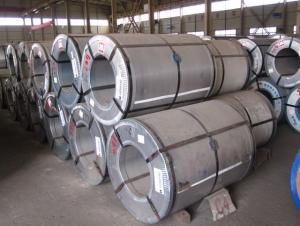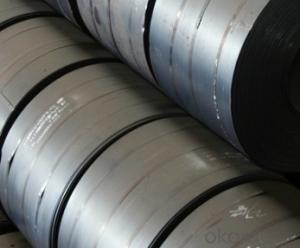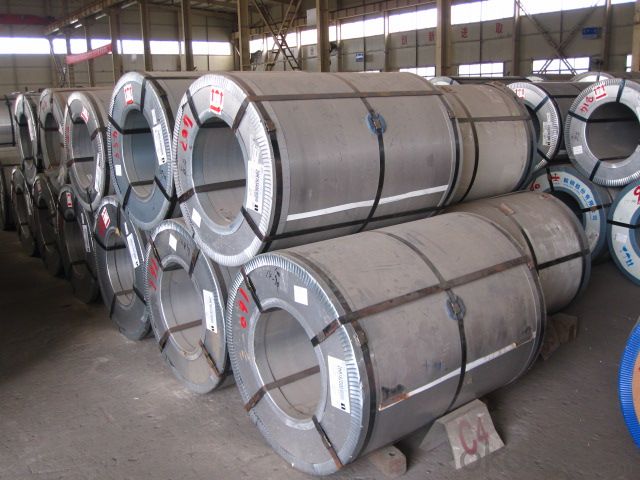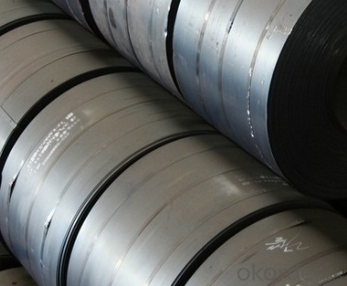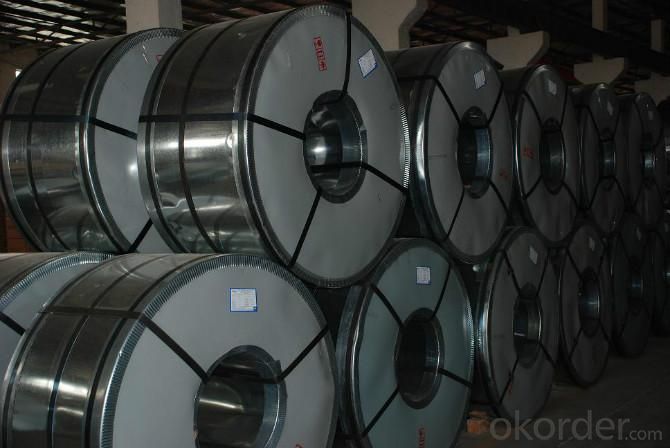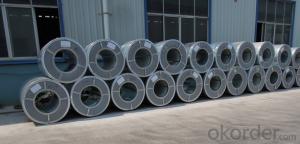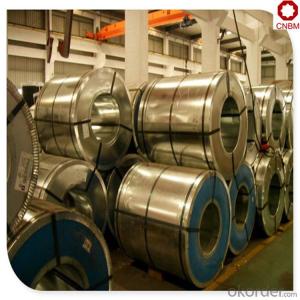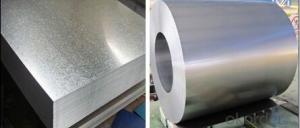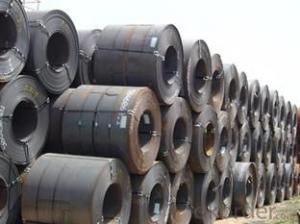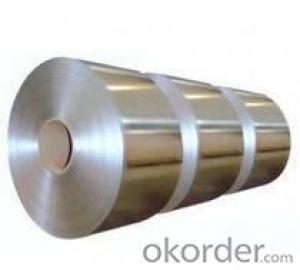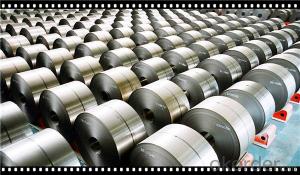Hot Dipped Galvanized Steel Coils with good use CNBM
- Loading Port:
- Guangzhou
- Payment Terms:
- TT OR LC
- Min Order Qty:
- 20 m.t.
- Supply Capability:
- 3000 m.t./month
OKorder Service Pledge
OKorder Financial Service
You Might Also Like
1.Quick Details:
Standard:AISI, ASTM, BS, DIN, JIS, AS 1397:2011, EN 10327 JIS G3321, ASTM A792M
Grade: EN 10327 JIS G3321, ASTM A792M
Thickness: 0.20-3.0mm
Model Number: EN 10327 JIS G3321, ASTM A792M
Type:Steel Coil
Technique:Cold Rolled
Surface Treatment:Galvanized
2.Packaging & Delivery
Packaging Details:Fully seaworthy export packing. Each coil is wrapped in water-proof paper.Fixed with steel strips.
Delivery Detail:about 12 days
3.Festure:
Certificate: | ISO9001, BV test |
MOQ: | 20MT |
Supply Ability: | 3000MT/month |
OEM: | Accept |
Price Item: | FOB, CFR, CIF |
4.Specification:
Standard | EN 10327 | DX51D+AZ, DX52D+AZ, DX53D+AZ, |
EN 10326 | SS250GD+AZ, SS350GD+AZ | |
JIS G3321 | SGLCC, SGLCD, SGLCDD, SGLC 400 | |
ASTM A792M | CS type C, CS type B, DS, SS255, SS345 | |
Base Metal | Cold rolled steel coils SPCC, SPCD, SPCE, DC01, DC03, DC04, CS, DS, DDS, Q195, Q250, Q350 | |
Thickness | 0.22mm-2.0mm | |
Width | 700mm-1300mm | |
Coil ID | 508mm, 610mm | |
Zinc coating | 60g/m2-180g/m2 | |
Surface treating | chromium free passivation, chromium passivation, fingerprint resistant, oiled | |
Spangle types | regular spangle | |
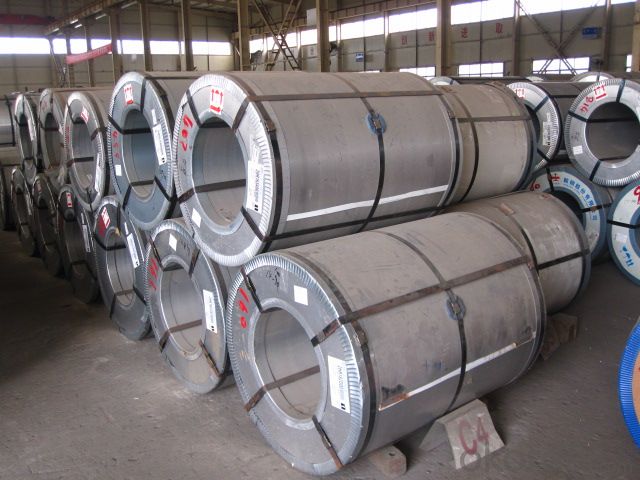
5.What is the application of Steel Coil?
There are two sides,one is out side: Workshop, agricultural warehouse, residential precast unit, corrugated roof, roller shutter door, rainwater drainage pipe, retailer booth;the other is inside: Door, doorcase, light steel roof structure, folding screen, elevator, stairway, vent gutter.
- Q: What are the challenges in coil recoiling for high-strength steel?
- One of the main challenges in coil recoiling for high-strength steel is the control and management of residual stresses. High-strength steel has a tendency to retain significant levels of residual stresses, which can lead to coil distortion or springback during recoiling. This requires careful process optimization and control to minimize these effects. Additionally, the high strength of the steel can make it more susceptible to cracking or damage during recoiling, necessitating precise handling techniques and equipment. Overall, the challenges lie in achieving uniform coil geometry, minimizing residual stresses, and avoiding any potential damage to the high-strength steel during the recoiling process.
- Q: i always have eaten rolled oats and i have never tried steel cut oats. what are your opinions on them for oatmeal and which do u like better?
- Steel cut oats, much better texture. You can prepare them overnight in a mini-crockpot with raisins, brown sugar, nuts or anything you like in your oatmeal. You can also put steel cut oats and all your favorite oatmeal toppings in a stainless steel thermos with boiling water overnight. Either way it will be hot and ready to go in the morning. Have a great day!!
- Q: How are steel coils used in the production of metal furniture?
- Steel coils are used in the production of metal furniture as they serve as the primary raw material for manufacturing various components such as frames, legs, and supports. These coils are unwound and processed through cutting, bending, and shaping techniques to create the desired shapes and sizes. Additionally, steel coils provide the necessary strength and durability to ensure the longevity and stability of the final furniture products.
- Q: Already on my team is Empoleon lvl 82Heatran lvl 74Scizor lvl 34Magnezone lvl 38What other steel types should I choose?
- Some other good Steel types to consider are: Steelix, Metagross, Lucario, and Excadrill. If you aren't against using legendaries, Genesect, Diagla, and Jirachi are good choices too. I would recommend Skarmory, but Skarmory is better to use in a competitve battle setting, and not a regular in-game setting (which is what I assume you're doing). The other Steel types you've chosen are very good.
- Q: Is it faster to smith steel or mithril in Rinescape assuming I'm going to mine everything myself?Mining level: 76Smithing level: 55
- i think steel
- Q: How are steel coils used in the manufacturing of wires?
- Steel coils are used in the manufacturing of wires by being uncoiled and then fed through a series of machines where they are drawn, stretched, and twisted to the desired diameter and shape. This process helps to strengthen the wires and make them more flexible for various applications such as electrical wiring, construction, and manufacturing.
- Q: What are the different types of steel coil cutting blades?
- Various types of steel coil cutting blades exist, each specifically designed for particular cutting purposes. 1. Slitting Blades: These blades are utilized to cut steel coils into narrow strips. They possess a straight cutting edge and come in different widths to accommodate various slitting needs. Industries like automotive, construction, and metal fabrication commonly employ these blades. 2. Shearing Blades: These blades are created to cut steel coils into flat sheets. They feature a curved cutting edge that enables a clean and precise cut. Steel service centers, where large coils are transformed into flat sheets for further manufacturing processes, frequently utilize shearing blades. 3. Circular Blades: Also known as rotary blades, these blades are employed for continuous cutting of steel coils. With a circular shape adorned with sharp teeth along the edge, they can effectively cut through the coil as it passes through the cutting machine. Industries such as packaging, printing, and paper manufacturing often make use of circular blades. 4. Guillotine Blades: These blades are employed to cut steel coils in a straight downward motion. Possessing a vertically moving straight cutting edge, they can effectively slice through the coil. Guillotine blades are frequently used in heavy-duty cutting applications that involve thick steel coils or large quantities of material. 5. Slitter Knives: Similar to slitting blades, slitter knives are typically smaller and employed in slitting machines that require multiple blades. Industries requiring high-precision slitting, such as electrical transformer production or precision metal stamping, often rely on slitter knives. Each type of steel coil cutting blade possesses unique characteristics and designs that render them suitable for specific cutting tasks. The appropriate blade selection depends on factors like steel coil thickness and width, desired cut quality, and specific application requirements.
- Q: So...that means Wolverine can stab him, right? Because Adamantite is stronger than steel. Correct?
- Faster than a Speeding bullet too!! They are just expressions/nicknames. Obviously he's faster than a speeding bullet, he can run from Kansas to Mexico and back and you wouldn't even know it. If you want it literally, just call him Superman, or extremely tough and fast man.
- Q: What are the safety precautions when handling steel coils?
- When handling steel coils, it is important to follow certain safety precautions. First, workers should wear appropriate personal protective equipment (PPE) such as gloves, safety goggles, and steel-toed boots to protect against cuts, impacts, and eye injuries. Additionally, workers should receive proper training on safe lifting techniques to prevent strains and back injuries. It is crucial to use appropriate lifting equipment such as cranes or forklifts to avoid manual handling injuries. Adequate clearance should be maintained between coils and other objects to prevent accidents or damage. Lastly, workers should be aware of the weight and dimensions of the coils to ensure they are properly secured during transportation and storage.
- Q: what is the porpose of preheating mild steel prior to welding
- ok dont listen to bob the builder down there, u preheat thicker steels to draw moisture out of them. take a propane torch to something exposed to just atmospheric air around 3 inches thick and the water will literally pour out of it. do u want that in ur weld? no. so u preheat to draw any moisture or contaminates out of the base metal. good luck.
Send your message to us
Hot Dipped Galvanized Steel Coils with good use CNBM
- Loading Port:
- Guangzhou
- Payment Terms:
- TT OR LC
- Min Order Qty:
- 20 m.t.
- Supply Capability:
- 3000 m.t./month
OKorder Service Pledge
OKorder Financial Service
Similar products
Hot products
Hot Searches
Related keywords
